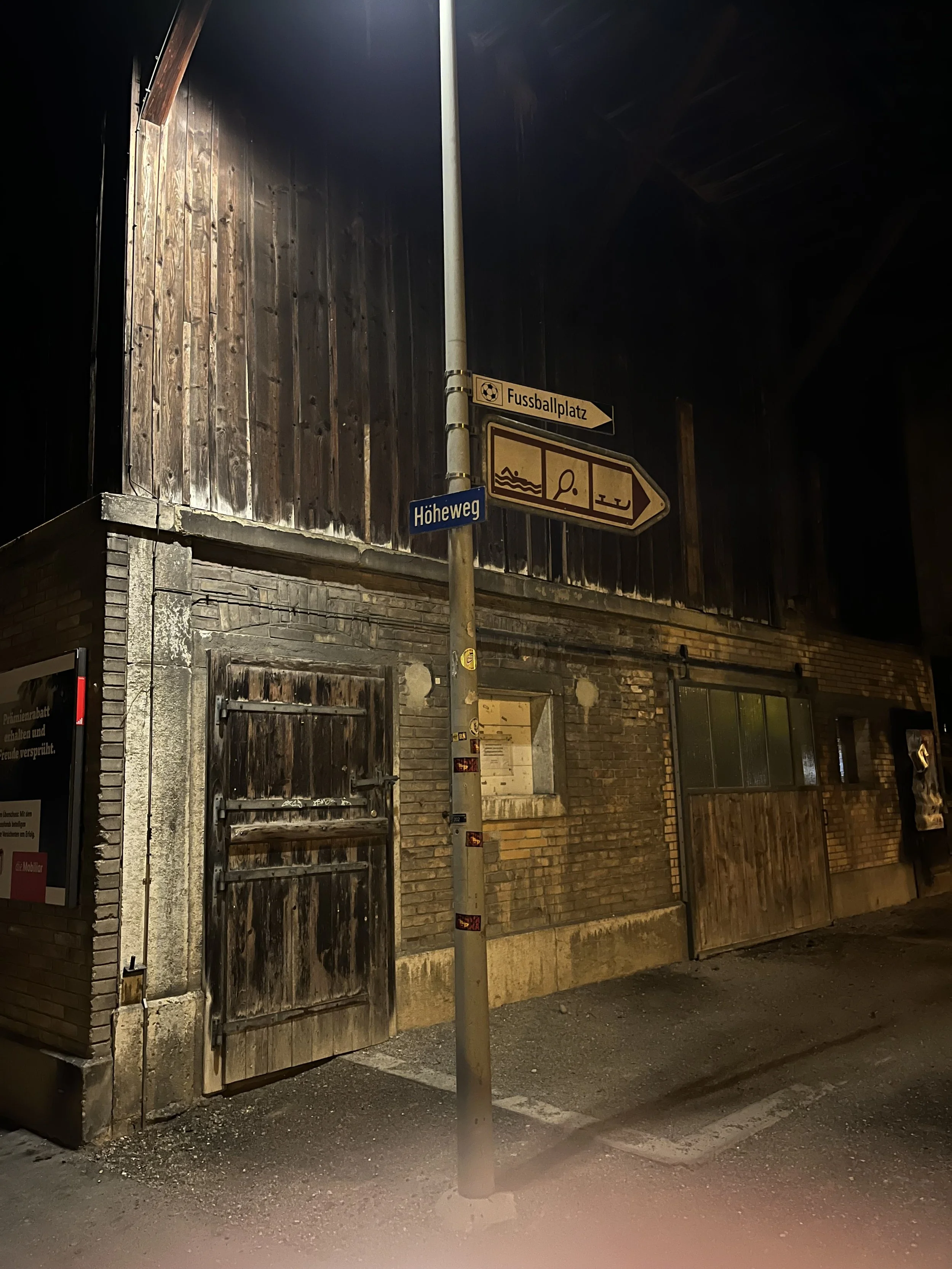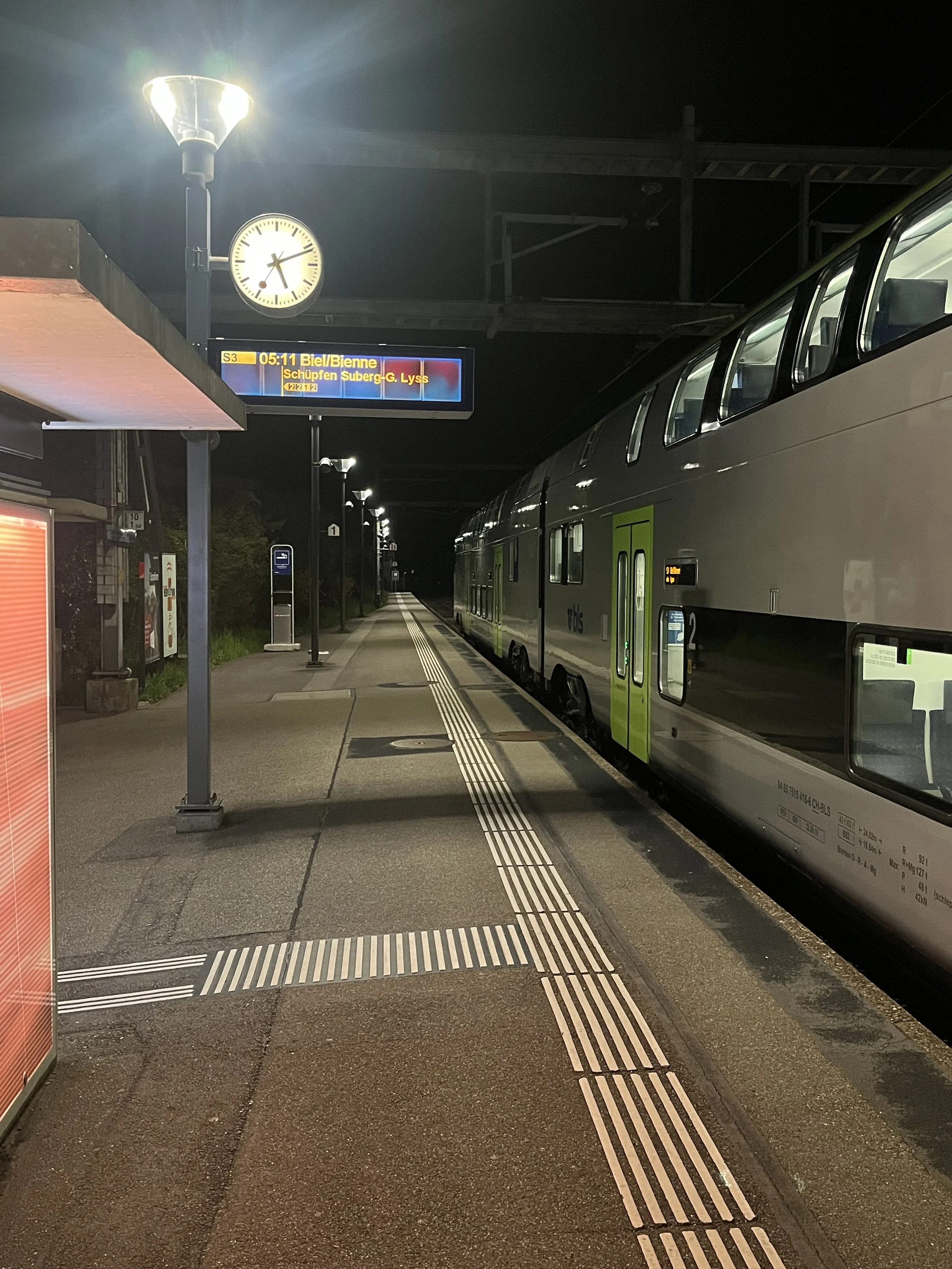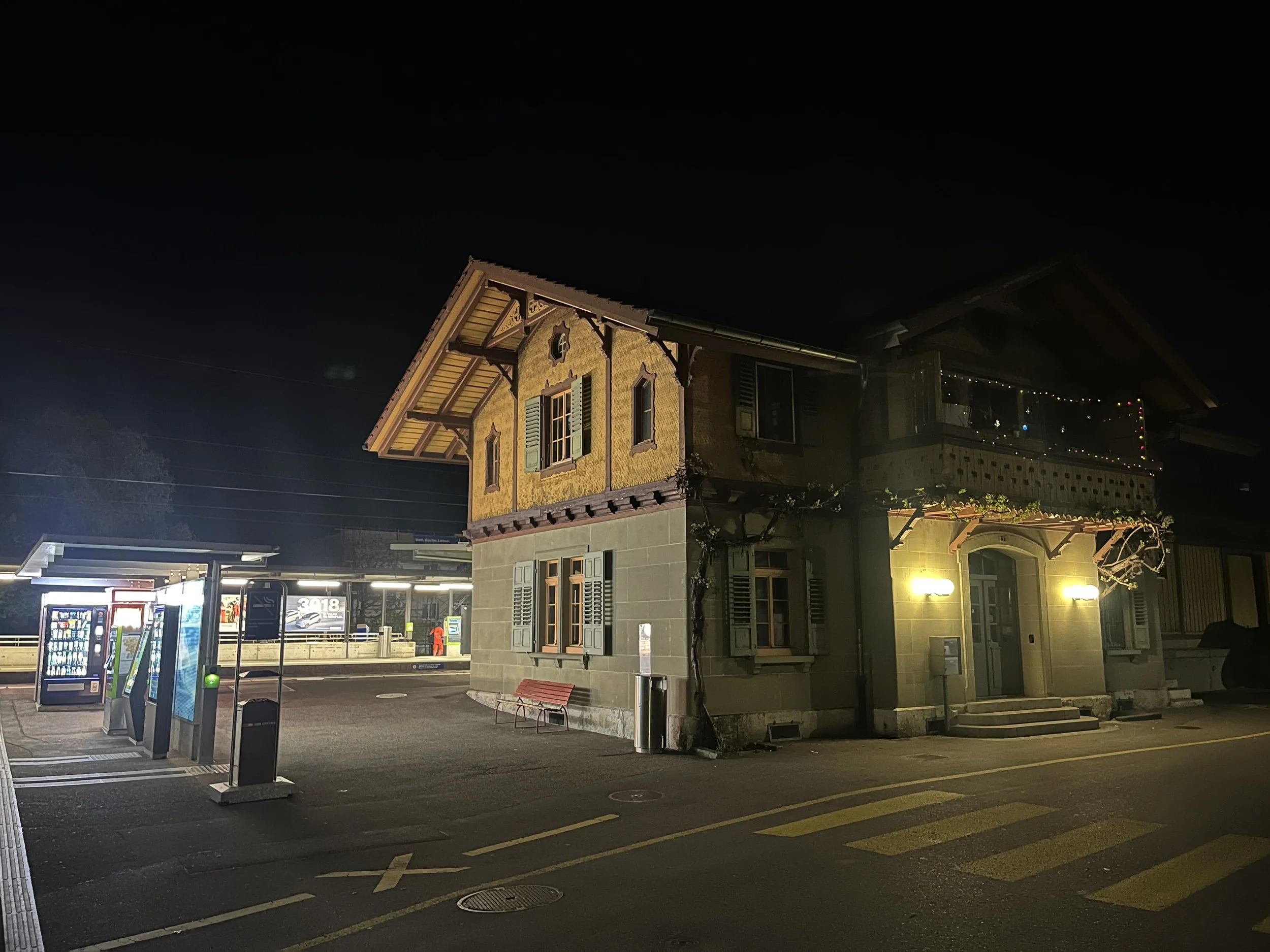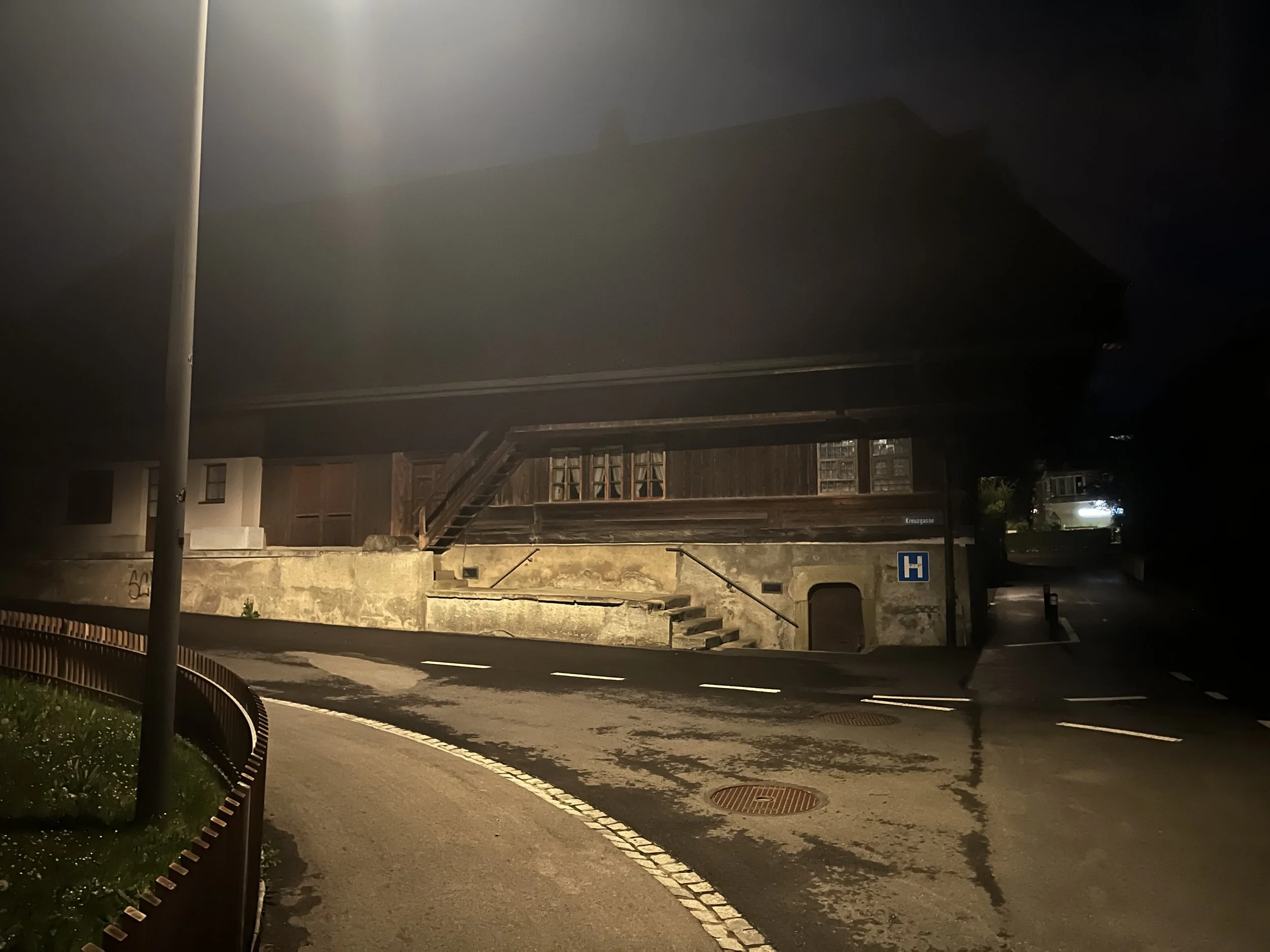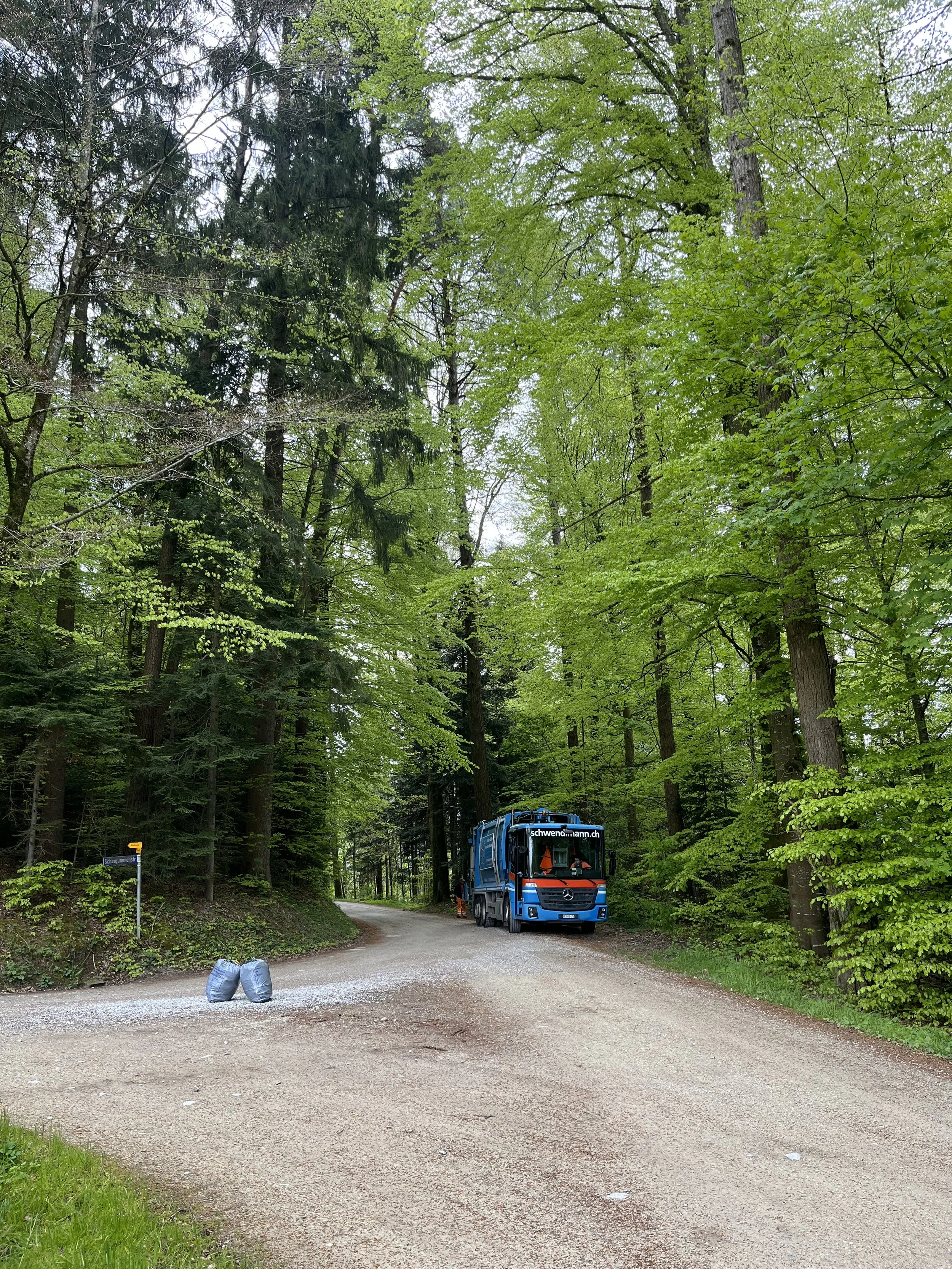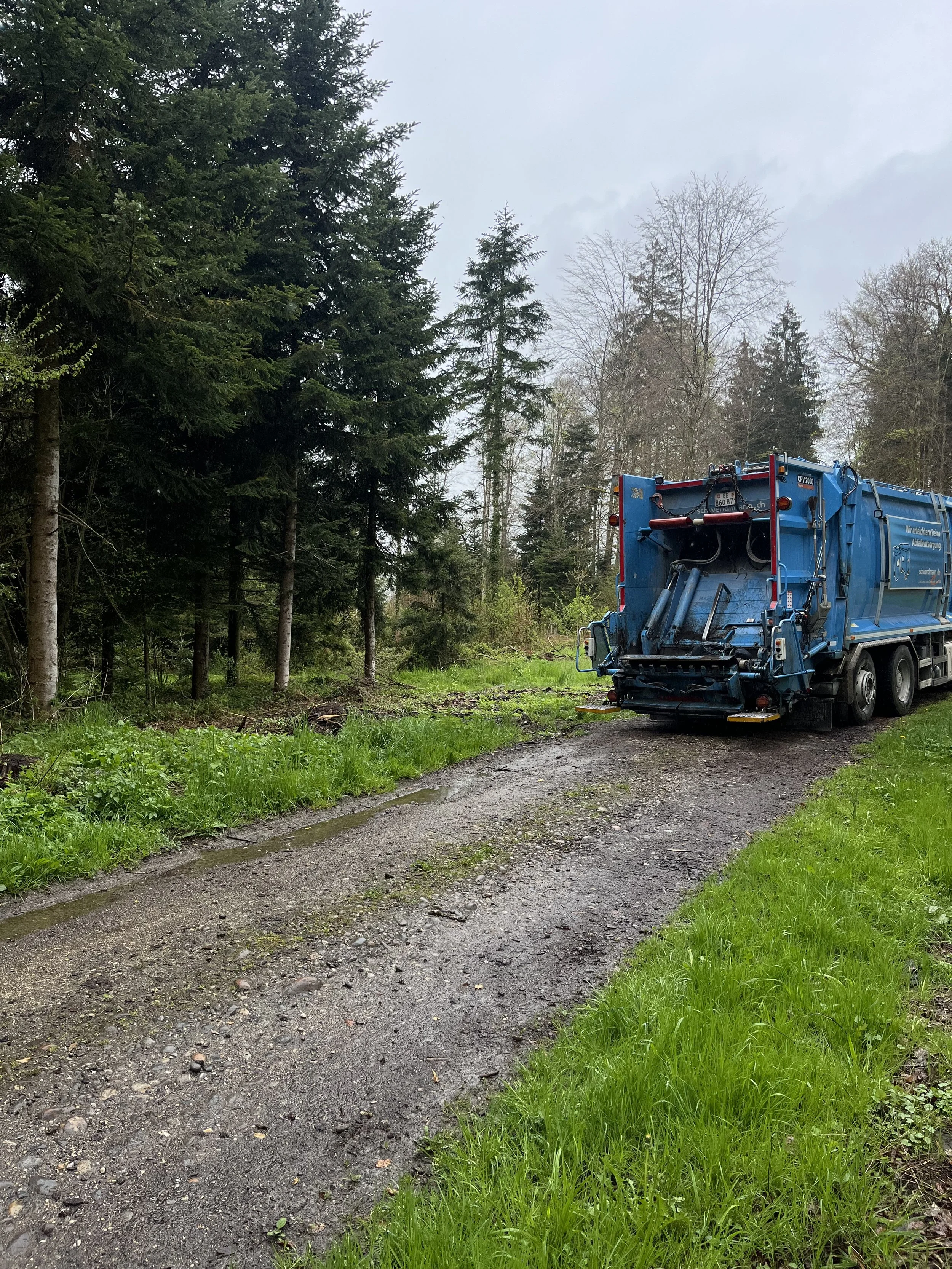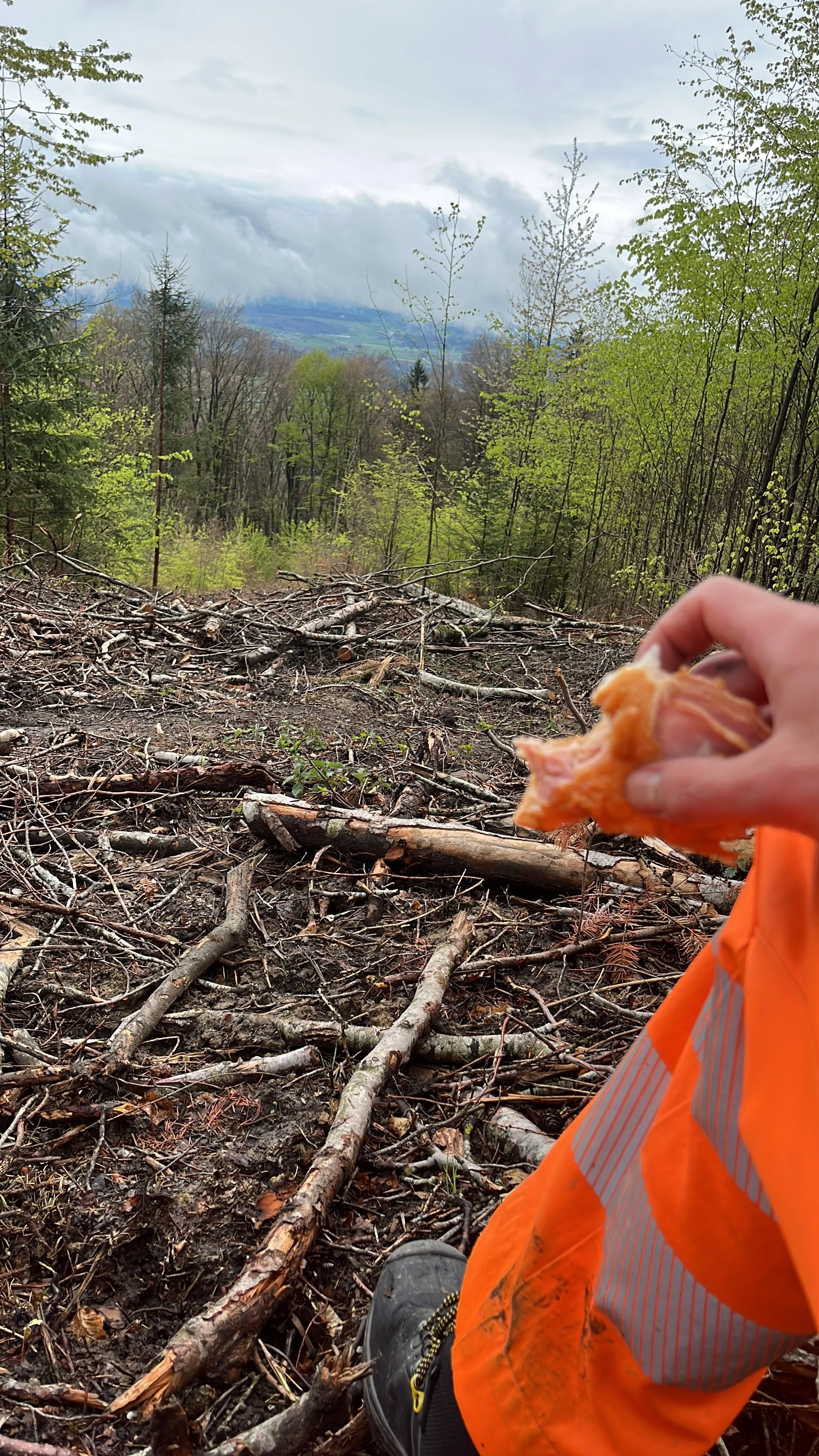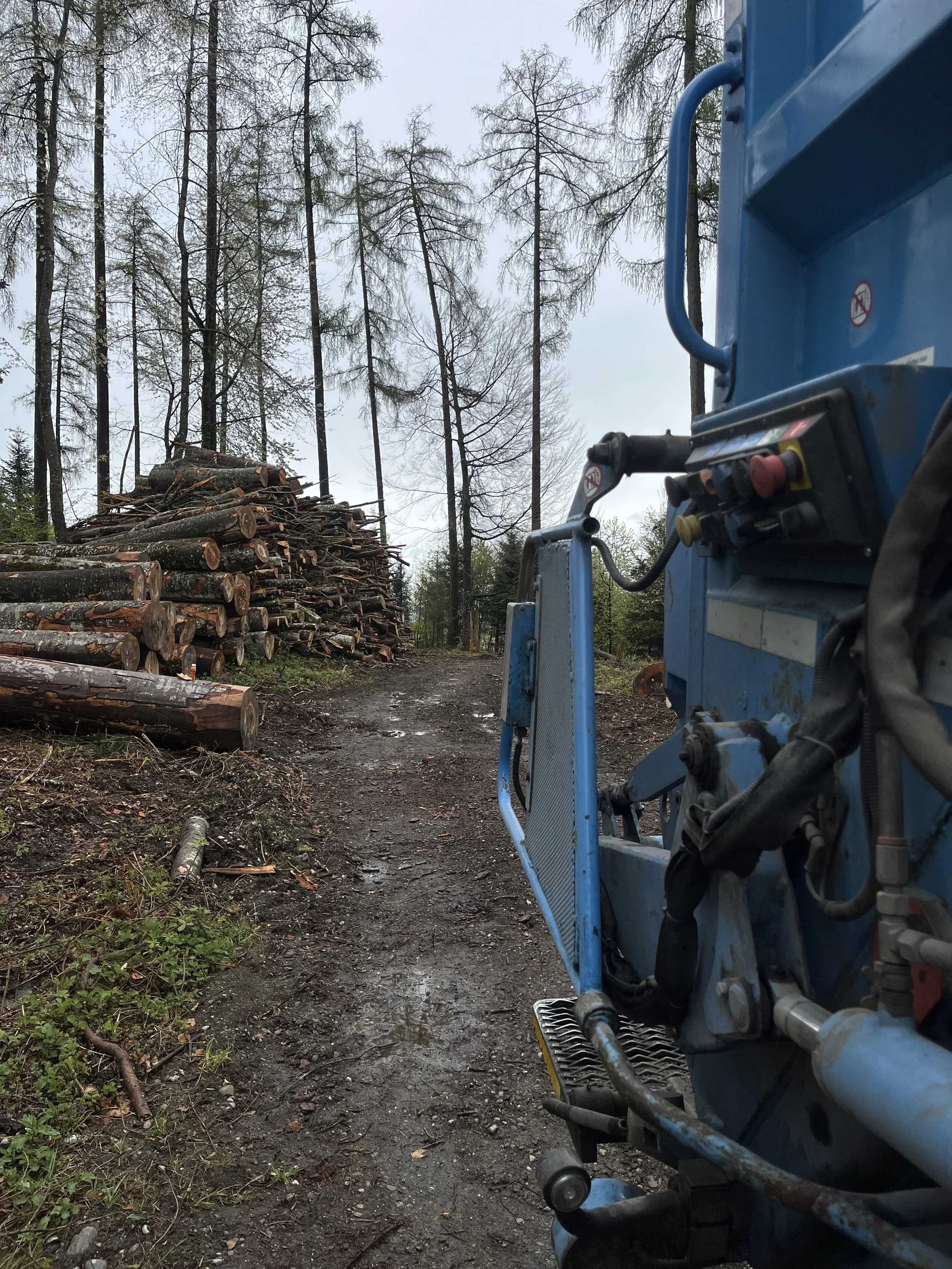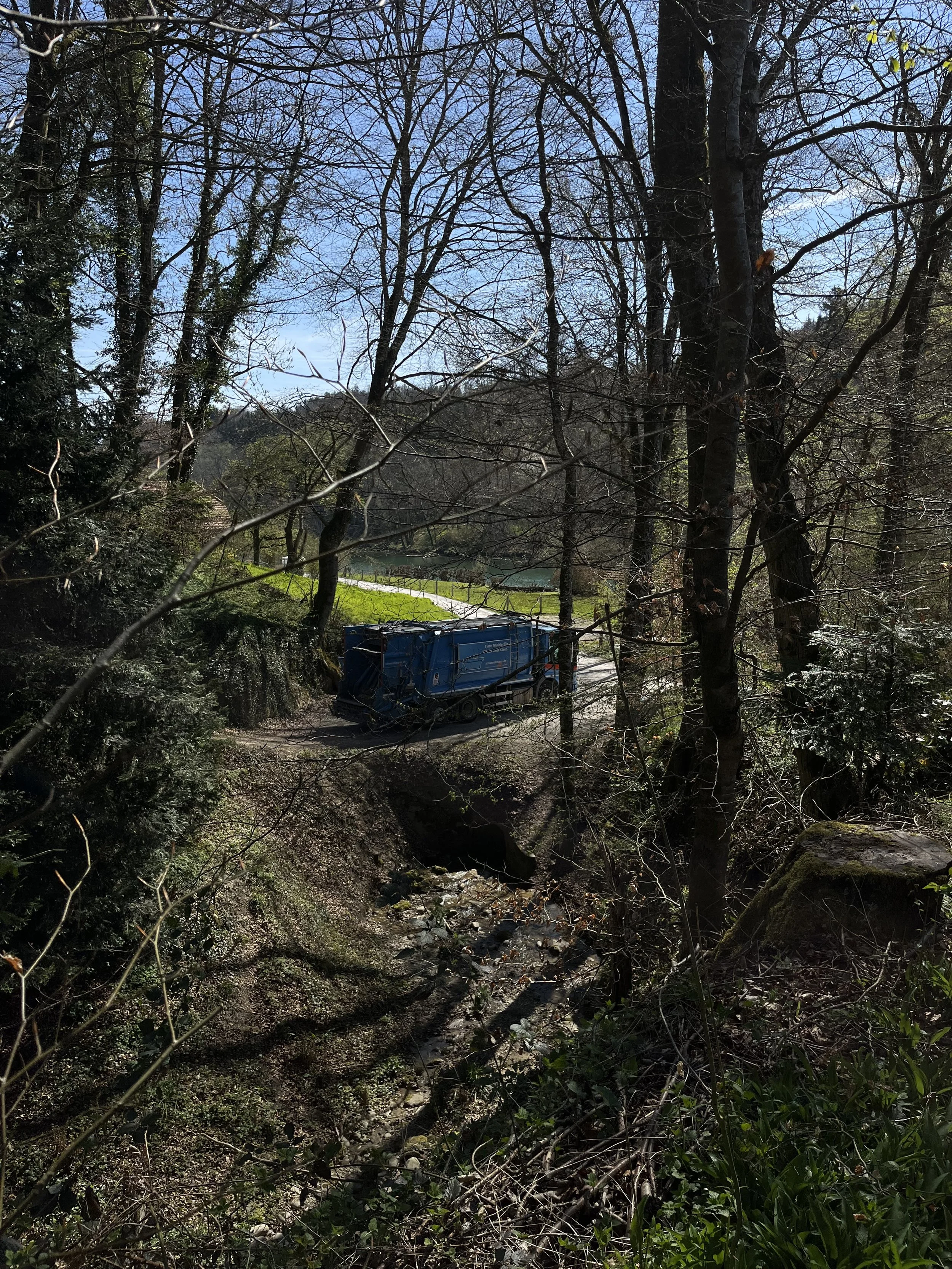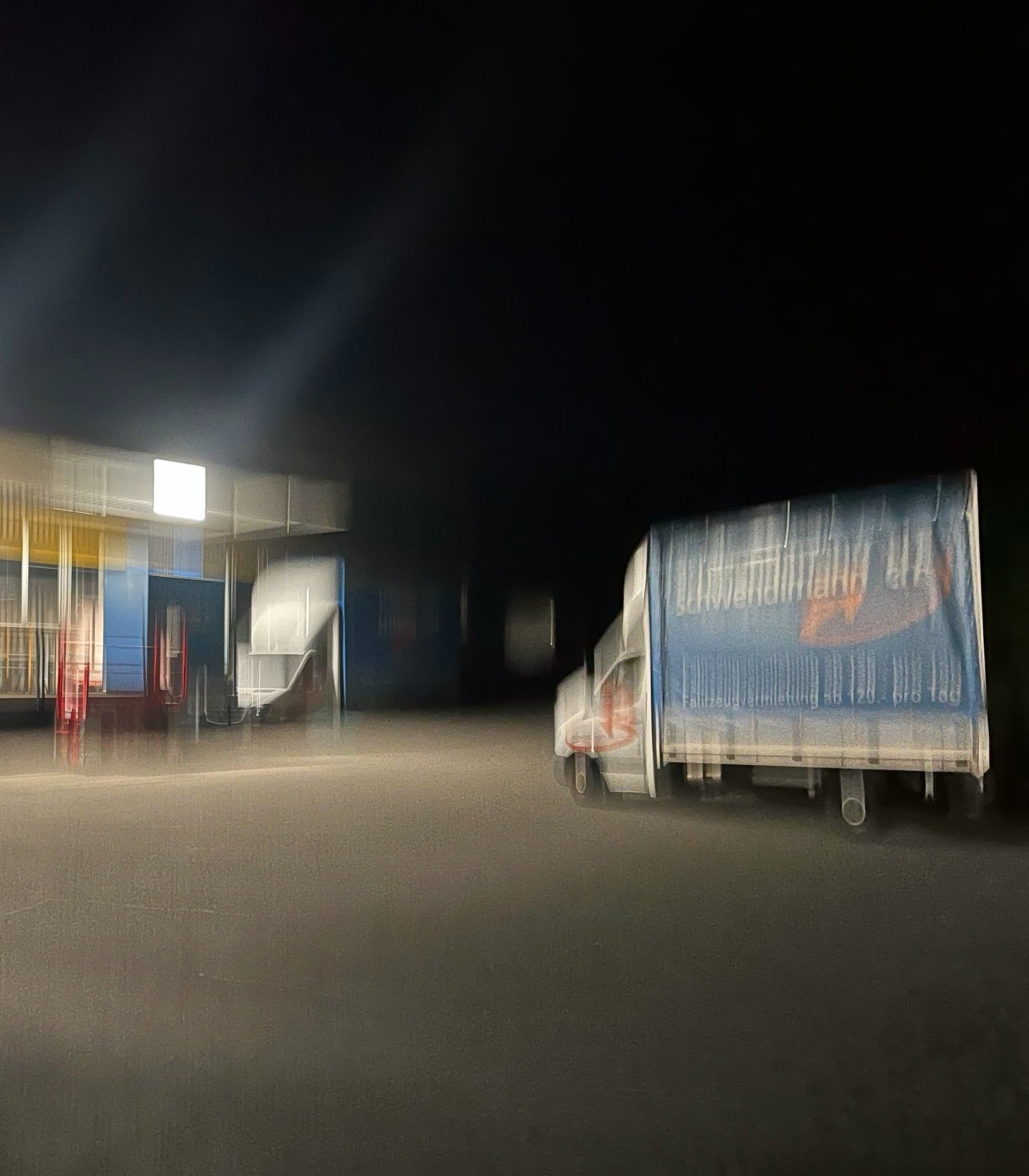
Schwendimann AG
It elementary school, one of my classmates didn't show up one day. I remember the teacher gathering us all in a circle and telling us that he got hit by a garbage truck on the way to school, but that he would be okay. I couldn’t wrap my head around it, how could anyone survive being hit by something so massive? The giant metal elephant charging in the side of some little car. I always remembered that deep rumble of the engine as it accelerated, the choking exhaust, but most of all, that thick, sour smell of the trash hanging in the air like a fart in an elevator. I remember seeing those guys hanging off the back of the truck, nose dangling over that stench on a blazing summerand thinking, man, that job must suck.
But here I am, that guy on the back of the garbage truck.
Thanks to my brother-in-laws connections, i got a part-time gig, collecting garbage throughout the Swiss heartland for Schwendimann AG. And I’ll get straight to it, you definitely smell that stanky-anky, only not as much as i would have thought. Most of the time I’m leaning off the side and wind is blasting my face, cruising through rolling farmland and tiny villages. I’m sure it would be whole different story if I were roasting my nuts of in a concrete oven like L. A. or Phoenix.
One thing i noticed immediately, the farmland here isn't laid out in neat, square patches like the expansive American Midwest. Instead, it flows with the land itself, with fields climbing slopes so steep i wondered how their tractors don’t tip over and roll down, draping over the curves of the terrain like fabric over a curvy women. Some fields are shaped like crescents, hugging the tree line, others like wedges or triangles, squeezed like puzzle pieces between small neighborhoods.
They feel wild and organic, defined more by the emotional terrain and the forests than by the farmers who tend them, like the land was never forced into order, but gently negotiated with over generations. Rather than a system built for efficiency from the top down, it seems to have grown outward as communities did, adapting to the land instead of bending it to fit a plan. There’s a quiet romance to it, as if the land remembers how it used to be.
Sometimes, we pass the same field several times in a day, watching its transformation in real-time: first, a machine gives the tall green grass a haircut; then another sweeps through, organizing it into tidy cornrows; and finally, one more comes through to roll it all into bales that lay scattered sparsely in the field.
And if we happen to be facing south, the white-capped jawline of the Oberland Alps lining the horizon. On the best mornings, when our timing’s right, the first light of day stretches across the peaks blanketing them in soft pastels of lavender and pink before the sun rises high enough to bleach them into their usual brilliant white.
However, no matter how beautiful the landscape looks as I lay dreaming about it, my alarm clock still cuts through the dark at 4:37 AM. I give myself fifteen minutes to make some coffee, pack a lunch, get dressed, and step out the door. If I’m efficient, I make it out within those fifteen minutes, at 4:52. More often than not, though, I’m still brushing my teeth at 4:55, which means, by the time I actually hit the road it’s 4:57,leaving me to cover the one mile separating me and the train station in 6 minutes, in order to catch the 5:03 train and it usually plays out like this. The last 400 meters of the road I take to the train station runs directly alongside the tracks, the final stretch until the station. Often, as soon as I reach that stretch, I glance over my shoulder and spot the train’s headlights closing in, fast and unforgiving.
To catch it, I have to stand up and sprint that final stretch. Legs burning. Lungs on fire, reaching the bike rack just as the train is stopping and the doors are just beginning to open. All I need to do is insert the key, pull out the cable, wrap it around the tire, and reinsert the lock. Simple in theory, but you’d be surprised how often I fumble the key, miss the slot, or put it in upside down. In those moments, every millisecond matters.
Then comes the final push. I bolt toward the platform and slam the door button just as it begins to slide shut. There’s always this milli-second of suspended tension, will it open again, or am I about to watch the train leave without me? So far, it always reopens, the doors hissing back to life with a hydraulic sigh as if annoyed it had to open twice. I slip inside, lungs burning, heart pounding, legs trembling from the sprint, and drop into a seat and for the first time since waking, chillax. My breathing begins to settle, the hammering in my chest dulls to a steady thump, and I let the brief calm of the eight-minute ride wash over me.
I often curse myself for not getting up just ten minutes earlier, trying to understand why I keep repeating this same frantic cycle, knowing exactly how it ends. But if I’m honest, I think part of me craves the chaos, that jolt of adrenaline, the pressure to perform, to focus so intensely that nothing else exists. No thoughts of the day ahead, no distractions, no room for doubt. Just the moment.
I arrive in Münchenbuchsee at 5:11, with time to kill before my shift starts at 5:45. I wander around in the dark and it reminds of me of when I was a kid during summer vacation with nothing to do, where I’d drift about until something grabbed my attention, be it the chipmunks and the bb gun or the burning of a small fire in the woods because i noticed some birchbark enticing me with a smooth curling just asking to be burned. Back when there was no internet to steal my attention or tell me what actor was in that one movie or how far it really is to China? There was no cell phone to store any phone numbers, either i opened up the phone book or had opened the phone book enough times to memorize my closest friends numbers.
Having this awkward freetime reminded me of how life used to be, when the days somehow seemed to moved slower and weren’t ruled by efficiency, productivity, and the constant pressure to solve, fix, and push forward. When time didn’t feel like it was slipping away, but instead served as a companion, something that gave you space to reflect, to observe, and to discover who you are by engaging with the world around you.
The silence is dense but not the kind that makes your ears ring. It’s the kind that helps notice the cat slipping silently along the curb or the dewy grass glistening beneath a streetlamp.
When its time to begin heading towards the job site, the road i take dips under a bridge that seconds as a tunnel. As i pass through, my footsteps echo. Sometimes, i will walk to where the pavement gives way to dirt and step into farmland.
Ahead of me, layers of gray stack into the distance, each layer a shade darker than the last: the field closest to me a pale gray, then behind it a darker band of trees, followed by a deeper-toned hill and another behind that, nearly black, leading to the sharp, wavy horizon where the land end in definitive black, just faintly contrasting the deep, rich violet glow if the sky.
Behind me, hanging low above the sleepy lights of Münchenbuchsee, the moon glows a soft amber-orange. She’s nearly full, just a little squashed on one side, as if dropped from above. A light breeze nips at my cheeks and fingers.
The earliness, the briskness, the darkness, the novelty of a new job all give me the sense of beginning a grand adventure, a soft buzz humming in my chest. It’s that same charged energy that you feel after finally arriving in some foreign land after a long, sleepless flight, disoriented, scanning unfamiliar sighs in an unfamiliar language trying to figure out how to get where you need to go by trying to. That type of energy that makes you want to get out of bed in the morning instead of sleeping in. A subtle current that nudges you towards the deep end and whispers, swim..
By 5:45, I’m on the back of the truck as it rumbles through still-sleeping streets, watching the world gently come alive. We navigate through the maze of tightly clustered, swiss neighborhoods and behind businesses, through alleys and loading docks, places most folks rarely see, the “in-between places”, where people are simply doing what needs to be done. We acknowledge one another with a silent, understanding nod and get back to what were doing. It’s not like the hustle of a Bahnhof or coffee shop, where people are alert, watching, posturing. This is something quieter and true. Not the cheetah in full sprint, chasing down an antelope like social media’s endless performance, but the cheetah resting in the shade, belly full, blinking slowly at the horizon.
The work is simple, no thinking, no planning, just doing. The type of work that stays at work and lets you sleep at night. Though boring as it may seem from the outside, hidden in the repetition are small, subtle nuances:
The weightlessness you feel as you lean into a corner. Simple turns become exaggerated at the rear, stretched out by momentum like the wide arc of an amusement park swing, and you can ether brace for it it ride it like a wave.
Or the way the driver handles those impossibly tight European turns. Often sharper than ninety degrees and on a slope, cars parked on both sides just to make things interesting, obviously. The driver might need to maneuver for a full minute, inching forward and back, tapping the brakes. I loved when he would have to fold in the parked car’s side mirror so i could swing it back open as we squeezed through.
How on smaller residential streets, individual trash bags line the curb and the truck rarely comes to a complete stop. There’s a kind of dance you can perform when grabbing a bag. With the truck still moving, you hop off, letting its momentum carry you forward as your legs slow you down. You bend, snag the bag, while beginning to rotate, twisting your body so that as you lift, the bag’s momentum is not just vertical but diagonally forward. When you let go, the bag flies like a line drive into the truck’s open mouth. That final bit of rotation carries you forward, so that one little hop lands you back on your small podium. The motion is continuous. The energy never stops, it just flows, start to finish.
How if it’s just a single, (hopefully) light bag, the driver, watching from the rearview mirror, sees us crouch, hanging off the truck with one hand and so navigates perfectly to snag the bag with the other hand, and swiftly toss it behind your back, all in one motion. Often, this small success is met with a brief, silent nod of recognition between the workers riding on the back.
Of the several sites where we unload waste, the largest sits quietly between Bern’s orderly neighborhoods and sweeping farmland. Operated by Energie Wasser Bern (EWB), the city’s government-run energy and utility provider, this sprawling, state-of-the-art concrete compound dwarfs the massive garbage trucks, making them look like children’s toys. It handles much of the region’s household waste, converting non-recyclable materials into energy that powers local homes and businesses.
Tucked out of sight yet central to the city’s infrastructure, collection trucks arrive from across the canton, each carrying tons of compacted trash gathered from local villages and towns. Before unloading, we driver pull up to what looks like a minimalist fast-food drive-thru window, a small communication booth equipped with a red-green light system. Here, the driver reports the origin of the waste and its general contents. The truck’s weight is recorded on a massive scale embedded in the concrete. Once cleared, the light flicks green, and we reverse into one of several towering bays, the garage-like doors rising to reveal a cavernous space that feels cinematic, for some reason reminded me of Toy Story. Inside hangs a massive mechanical claw suspended from an overhead track, like from the arcade crane game. But instead of plush toys, it’s capable of moving several tons of compressed waste in a single swoop.
As the truck begins to tip its massive, 10 ton load, there’s surprisingly little sound the space is so vast that the crash of trash hitting the floor is swallowed whole. The claw swings into action, redistributing the waste into holding areas where it will later be fed into incinerators that generate heat and electricity.
Before leaving, we tidy up the rear of the vehicle and roll back onto the scale to measure how much has been offloaded. A typical garbage truck can compress waste with its hydraulic piston up to 2,000 pounds per square inch of pressure, equivalent to the bite from a crocodile or what the ocean feels like at around 4,000 feet underwater. For some reason my mind likes to imagine what it would feel like to slowly be crushed in the back of the truck, what it would feel like for my head to slowly get squeezed so hard that my skull eventually crumbles. We regularly toss in entire furniture sets or thick sections of fencing, and that thing mercilessly crushes all of it without breaking a sweat.
Or how when we encounter larger clusters of containers, how the driver steps out and the three of us nonverbally synchronize. One operates the lift, another clears emptied containers and brings in new ones, while the third guides the process. As one container is hoisted and emptied, the next is already sliding into position, like teeth on a zipper.
Lunch breaks are strategically timed to fall at a point in the route where we’re near the edge of the woods, usually down a gravel road tucked away from the noise of town.
Our uniform is a loud, fluorescent orange. It’s standard here in Europe for anyone doing hands-on work: construction, road crews, garbage collection. High-vis gear that says I’m working! And oddly enough, it seems to bring people a quiet kind of comfort knowing that I’m not trouble, not a question mark. I’m the answer, reminding them the wheels of the world are turning. That the necessary, unglamorous jobs are being handled. And when I pass someone else in the same orange, there’s a moment, a nod, a hand raise, maybe just a glance. A wordless salute. Like two motorcyclists passing on a busy road. You see each other. You recognize the grit. The long days. The quiet pride of doing what needs doing.
fertig
Despite the work being exactly what I was looking for, physical and mindless, I developed a deep frustration and even a traumatic aversion toward it. Pathetic right? A trash collection guy, traumatic? It beat me, or should i say I beat me. Because it wasn't the work itself, rather the combination of the language barrier and the power of my negative thoughts.
Generally, blue-collar folks are people you can lean on, direct, reliable, i mean come on, they are the reason the world goes around. But they can also be raw, brash, and in this case, completely uninterested in talking to the foreigner who couldn’t speak their language. Add to that the swiss cultural backdrop, one that can come off as distant or so reserved it borders on unfriendly, like they genuinely didn’t want me there. Three seats in the truck, driver, middle guy, then me, jammed against the window like excess baggage. From 5:45 in the morning until 4 p.m., I worked and rode in silence. More often than not, that middle guy wouldn’t just talk to the driver, he’d also physically turn slightly towards him, like my presence was offensive. So I sat there, day after day, hour after hour, listening to conversations I couldn’t understand, locked in my own head.
At first, I didn’t mind. Coming from a job as a fitness trainer, where I not only talked all day but directed the entire experience, the quiet was appreciated. But over time, it started to gnaw at me. I couldn’t join the banter, the jokes, the simple day-to-day exchanges that make even dull work feel human. Top it off that that has been the case since arriving in Switzerland nearly a full year ago, enduring that same silence that makes me feel inferior. And thats when my thoughts spiraled.
What would eventually happen, is that every time i would get called in for work, my mind would involuntarily run a quick reel, always the same scene: the first morning I arrived. Nauseous and feeling weird because i got no sleep. Walking into the big commercial building wrapped in cold metal siding, up a small set of grated galvanized steel stairs and into the cavernous warehouse. I rounded a corner into the wide open break area cast in white fluorescent light. Inside, a group of hard-nosed, blue-collar guys sitting around a table, drinking coffee and bullshitting, watching people arrive. Unlike the guy who preceded me, who was greeted with a loud chorus of “morges” i was given looks of weariness and cold silence.
There were a few other tables, but everyone had claimed seats at one, leaving the adjacent tables empty. I took a breath, crossed the room confidently, circling their table, trying to make eye contact with just one of them. I felt like the lowest-ranking hyena at the feast, hovering near the circle, hoping for a crumb while they devoured the main course.
I pulled a chair over to join the group, took off my backpack and jacket and just as i sat down, they all stood up and headed for the trucks. Bad timing? Maybe. But at the time, it felt like some sick joke.
I trailed in the back of them to the main hanger, a massive steel beamed structure housing rows of collection trucks,,I felt like a wounded animal trailing behind the herd, one they'd rather leave behind so as to not weaken the herd. They dispersed like clockwork, each knowing exactly which truck and with whom they'd be riding with for the day. i stood there feeling like an idiot, watching and waiting in my fluorescent uniform, trying to figure out which truck seemed to be missing someone. Eventually, I wandered from truck to truck, attempting nonverbal eye contact with the driver “am i with you?”
The trucks began to pull out, one by one, making me feel both better and worse, better, because each truck that left told me that was definitely not the truck i would be on. Worse because my stupid mind starting throwing bullshit fears at me like “what if they all leave” Finally i met eyes with a driver, seemingly upset that it took me so long to get there even though he could clearly seen me trying to find my truck the whole time.
“Matteo?” he called out
“Yea”
“Come, du bist mit uns”
And that was how the mornings would go.
Over time, I started showing up just in time. Even if it was freezing or pouring rain, I’d time my arrival to skip the breakroom and the awkwardness altogether.
After work had a similar vibe. We’d return to another massive garage where trucks were refueled or serviced. Sometimes there’d be a short wait in line, and once again, everyone knew their rhythm—their people, their system. I lingered off to the side, unsure of where to stand or who to talk to drifting about like an idiot.
And I fucking hated it. Despised it, and grew slightly traumatic towards these inevitable situations happening twice every work day. No matter how hard i tried to integrate, anyone caught speaking to me in front of coworkers seemed to carry a certain social tax, like talking to the dweeb nobody liked at recess. And after sitting with my thoughts all day, piss pounding me with the dread of those moments, and even when things were fine, that anxiety started tinting everything else. It slowly became the lens I saw the entire experience through.
The energy i accumulated toward that job followed me like a shadow, into my weekends, to the dinner table, i hated it. And i believe that quiet hatred, that low, invisible hum of resistance combined with the very visible language barrier, added up in a way that would eventually cost me the job.
One shift, they paired me with a guy who had worked there for 33 years. A Schwendimann lifer. He was a walking rulebook, robotic, stuffy and obsessed with doing things his way. I’d worked with several others before him and each had their own way of doing things. Some were rough and fast, tossing bins with a kind of efficient violence. Others were gentle, returning bins with care, locking the wheels even on flat ground, where it clearly wasn’t necessary. I preferred the rough-and-ready style, but I adjusted, matched their pace, their quirks. Whatever. It’s trash. You throw it in the truck and move on. I was good at it. Efficient. Strong. A young buck ready to hump. I kept up, and most people could see that. Even Mr. 33 Years complimented me a few times in the beginning of the day.
But then, near the end of the shift, he said something that I didn’t catch a word of it. Usually, I could fake it, nod, smile, whatever, but this time I had nothing. I must’ve broken one of his sacred little routines, his holy commandments, perhaps i was too rough, or didn’t hump one of his dear bins goodbye before returning them to the curb, I don’t know. But whatever it was, it wasn’t about getting the job done. It was petty bullshit that he loved to finger himself with.
The next shift, I was called into the office.
I walked up to the mezzanine and asked for Daniel. He didn’t say a word, just brushed past me with that typical tight-lipped Swiss stiffness and led me through the heavy into an empty room.. He waves for me to sit and took the seat across from me This isn’t a check-in. It’s a reprimand.
“Wir haben gehört, dass du mit den anderen nicht funktionierst.”
Translation: “We’ve heard you’re not cooperating with the others.”
I sat there, stunned. Are you fucking kidding me? Not only did i think i was preformed my job with efficiency and safely, i fucking knew i did.
I wasn’t slacking. I was doing the job, fast, clean, no complaints. But Not cooperating? I couldn’t believe it. This wasn’t rocket science, we were throwing garbage into a truck. I knew I was doing my job efficiently, safely, and in sync with whoever I was paired with. And after days and weeks of being completely isolated by language, the accusation just broke something in me.
I looked him in the eye, frustrated even more because my broken German made me sound like an idiot, and told him it was bullshit. That i can look into his eyes and the eyes of a mirror and stand behind my work ethic. I was pissed. Shaking. Some stiff, uptight office guy, who’s never worked with me, telling me I don’t function? Who the fuck is this guy? I wanted to grab his bald head and slam it into the table.
Turns out, Mr. 33-Year Trash fucking Hero had gone crying to the office, complaining that I didn’t “function.” Not because I missed bins or slacked off, but because I didn’t understand whatever the fuck bulshit, self-important ritual he decided was essential that day.
And that was it. They called me in for one more shift after that. Then nothing.
That’s why, on that sunny day, two weeks after my last shift, when I went in to return my clothes and get the paper that confirmed I worked there (Arbeitsbestätigung), I couldn’t have been more excited to put a dagger in this experience.
but the truth is, it wasn’t the job.
It was me.
It was my own mind. My inability to catch my thoughts before they grabbed hold and pulled me under. My tendency to see what I feared was in front of me instead of what actually was. My inability to get out of my own damn way. It was not the work. Not the people. Just…me.
Jobs like these rarely make headlines. But they’re essential. Without them, especially garbage collection, cities would literally fucking stink. Order would decay and the rats and racoons would rise to power. It’s easy to forget that behind every clean street or functioning public system, there are people who have been doing the same fucking job since the dawn of time.
Despite how things ended, I took pride in being part of the engine that keeps cities moving.
What I’ve shared here was told from a place of pain, disorientation and through the chronic fatigue of being unable to express myself. If i knew the language, this would have been an entirely different story that would have no doubt ended on a higher note. I failed to adapt, instead focusing my attention on what I perceived as pettiness, rather than seeing them as expressions of loyalty to one’s craft. Since finishing, i have realized this experience was yet another sanding belt, grinding away at my rough edges and teaching me the virtue of humility. And in that friction, I can see even more clearly what things i have yet to work on.
